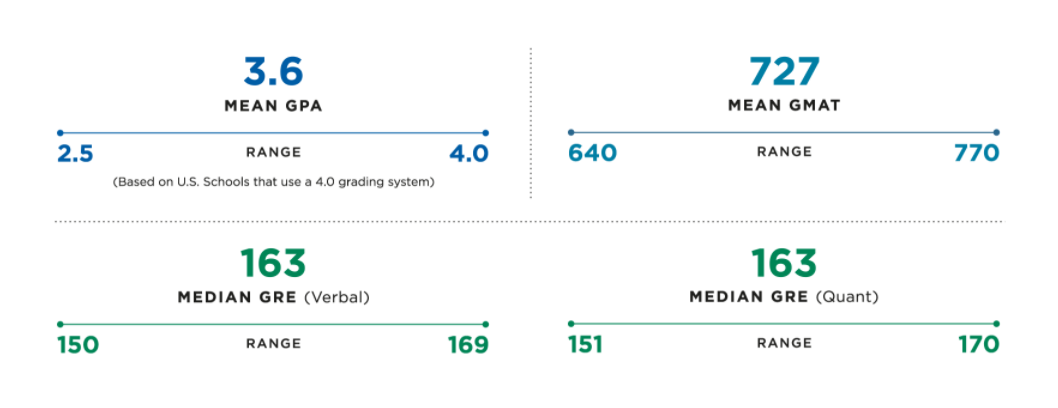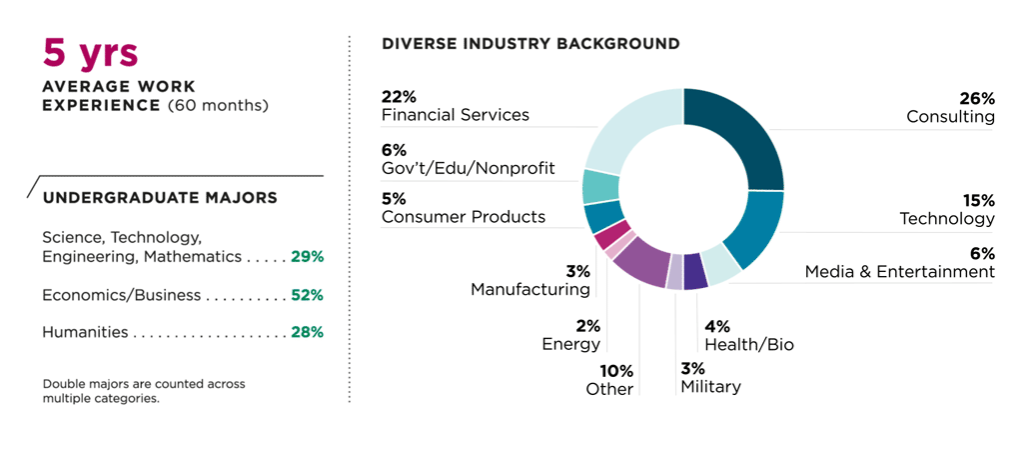This article will provide an in-depth guide on how to write the Northwestern Kellogg MBA essays. The Kellogg essay questions play a critical role in your acceptance, especially with how competitive the admissions pool is.
Before we get to that though, let’s go over just how difficult it is to get accepted into Kellogg.
How Hard is it to Get Accepted Into Northwestern Kellogg?
Kellogg Class of 2022 Profile
- Acceptance Rate: 21%
- Mean GMAT: 727
- Median GRE (Verbal): 163
- Median GRE (Quantitative): 163
- Average Work Experience: 5 years
As you can see, Northwestern’s Kellogg MBA admissions are quite tough. In terms of academics and test scores, you will need to be in the upper percentile to fit in the student profile.
Remember: Kellogg’s admissions rate is 21%. This still makes the school extremely difficult to get into. If you want to get accepted, you will need to have an above-average GPA, GMAT score, and GRE score. Having a strong set of essays will also help you stand out from the rest.
This brings us to the next question: just how important are the Kellogg MBA essays?
Considering how they use holistic admissions, we can safely say it is very important.
The most important thing you can get across in your application is your authentic self. We do not want to shape the incoming class of Kellogg with students who look the same, think the same, and come from the same background and experiences. We need to understand what makes you different in order to understand what strengths you bring to the Kellogg community. The only way to accomplish that is to be authentic. Our holistic admissions process depends on it. So please keep authenticity top of mind as you begin to think through your application materials. We really want to get to know the real you!
Northwestern Kellogg MBA holistic admissions
Standing out amongst the crowd, showing your genuine self, and allowing the admissions officers to see you past your academics is crucial. It’s also why they implemented the video essay! This is good news: writing a strong essay can give you the boost you need to get accepted!
With that said, let’s take a look at how to write the Northwestern Kellogg MBA essays.
How to Write the Northwestern Kellogg MBA Essays
Table of Contents
- Kellogg MBA Essay Prompts
- Kellogg Leadership Essay
- Kellogg Values Essay
- Additional Questions Sections
- Kellogg Video Essay 1
- Kellogg Video Essay 2
- Kellogg Video Essay 3
Kellogg MBA Essay Prompts
You can find the full Kellogg MBA Essay Prompts list including tips and tricks on their official website here.
Kellogg Leadership Essay

1. Kellogg’s purpose is to educate, equip and inspire brave leaders who create lasting value. Provide a recent example where you have demonstrated leadership and created value. What challenges did you face and what did you learn? (450 words)
Kellogg Leadership Essay Prompt 1
There are a few key points to consider when writing the first essay. The first is “educate, equip, and inspire”. The second is “lasting value”. The third is “What challenges did you face”. The fourth is “what did you learn”?
Let’s deconstruct these.
When Northwestern says their purpose is to educate, equip, and inspire, they also imply that they want students who have something of value to gain from their institution. Let’s take an example. A successful businessman making upwards of 350,000 a year wants to take an MBA program. They may or may not gain any benefit from it. On one hand, they may gain some valuable knowledge to improve their existing business. On the other hand, he may be too busy to learn anything or even gain anything in his field. Now, let’s take a student who already has experience working as an intern for a few companies. They may have a lot of experience, but they have something to gain from the MBA program.
Northwestern wants people who are actually going to gain something from their MBA program. That means people who aren’t just applying for the vanity factor of getting accepted. Make sure it is clear throughout your essay that you are an open book and ready to learn. You know exactly how Kellogg can help you with your future endeavors, and you have a clear path to it.
Now, let’s talk about lasting value.
Northwestern’s Kellogg wants students who have a well-articulated and planned path to creating lasting value. That means you can’t just have an arbitrary career path with money as the main goal. Maybe your future business or venture will involve an overarching moral value. Perhaps you want to provide a lasting value to the world that would make life easier for the common person. Most great leaders have a vision similar to that: “creating value for people”. In fact, it’s one of the quintessential aspects of a good business! Don’t start with money as the goal, start with providing value to people first! If you show that you have a plan to create lasting value for people, you also demonstrate that you know the fundamentals of business!
The next part is “What challenges did you face.”
Sure, some people will have more meaningful and difficult challenges to face than you did. There’s a hierarchy of difficulty. That doesn’t mean that you should lose all hope! The admissions officers at Northwestern don’t just want to know what challenge you faced. They want to know why that challenge makes you a valuable candidate for their MBA program. So, when addressing this part of the question, you’ll need to cover the aspects of the challenge that make you a great leader. Let’s take a look at this example.
- Applicant 1: father had a strong internship opportunity at a Fortune 500 company lined up for them. They were able to get a strong position, and gain a lot of valuable experience from their internship.
- Applicant 2: worked with a non-profit fundraising team during undergrad. Realized that many of the people there only casually cared about the cause. Most people in the non-profit just wanted something to put on their resume. The second applicant decides to take things to second gear, and take on an aggressive-growth strategy. This inspires some members of the team, whilst offending others. However, at the end of the day, applicant 2 has grown the non-profit into something more than it could have ever dreamed of.
Both of these topics are strong; however, the second applicant will have an easier time showing how they are a suitable candidate. They demonstrate characteristics and personality traits that will help them get far, whereas the first candidate only has the privileges presented to them. It’s not to say the first applicant is a lost cause; in fact, it’s a wonderful topic. They just need to work harder to show how the characteristics they’ve developed will help them get accepted.
The fourth section is the “what did you learn” part.
This part goes hand in hand with the third section. That is, what exactly did you learn or how did you grow from the experience? Does this make you a strong candidate? If you can tie in the experiences, values, or character traits you’ve gained with how it makes you a good candidate, then you’ll have proven to the admissions officers that you are a good fit. Remember: the admissions officers want someone who is a good “fit”.
With that said, let’s move on to the second essay.
Kellogg Values Essay

2. Values are what guide you in your life and work. What values are important to you and how have they influenced you? (450 words)
Kellogg Values Essay Prompt 2
You can think of this question as another “fit” question. How do your moral compass and philosophy make you a great fit for the institution you are applying for?
You should also consider the first sentence of the question too. “Values are what guide you in your life and work.”
More often than not, people pursue a certain industry based on their personality traits. For instance, agreeable people may create a non-profit institution to try to help as many people as they could. Disagreeable people have a proclivity to win, so getting into law may fit their desires. People who are orderly need everything to be “just right”, so management work may fit them best.
These don’t just have to be intrinsic personality factors. They can also be real-world values such as the need for social justice or the necessity of economic prosperity in struggling communities.
Then the next part comes: “What values are important to you and how have they influenced you?”
One of the difficult parts of this prompt is fitting in the word count. Oftentimes, people answer this question and get a little too far off track. After all, it’s the values that are important to them! However, you need to remember to answer the prompt. Maybe your experience managing a small team and getting them to pick themselves up by the bootstraps was a transcendent experience, but you need to remember to get right to the point. How did it influence you? Did it shape the career path that you want for the future? More importantly, did this personal value influence your decision to choose Northwestern’s Kellogg compared to every other school?
Additional Questions Section

One-Year applicants: Please discuss your post-MBA career goal, the current experience you will leverage to support the transition, and the Kellogg 1Y opportunities that will help you reach this goal. (250 words)
MBAi applicants: The Kellogg McCormick MBAi program is designed to train the next generation of leaders who can help businesses deliver successful outcomes through AI-driven technology. This requires leaders who have both strong technical and business skills; many firms struggle to find leaders with these skills. Tell us about your firsthand experience with this disconnect between business and technology and how MBAi will prepare you to successfully lead businesses at the intersection. (450 words)
MMM applicants: The five core values of the MMM Program are curiosity, creativity, empathy, open-mindedness and a learning mindset. Describe a situation in which you demonstrated one of these values. Why is this value an important part of the MMM experience for you? (250 words)
JD-MBA applicants: Please discuss your post-JD-MBA career goals and why the JD-MBA Program is the right program to help you reach those goals. (250 words)
Reapplicants: Since your previous application, what steps have you taken to strengthen your candidacy? (250 words)
Kellogg Additional Questions Essay Section
There are quite a lot of additional questions, but they may not apply to everyone. Thus, we’ll cover these shortly and take them one at a time in respective order.
One-Year applicants: As a 250-word essay, the first additional questions section requires you to be concise with your wording. The same goes with the third, fourth, and fifth ones. This is in some ways another version of the “why us” essay. You will need to talk about your future aspirations, how your experience will help you transition into it, and why Kellogg will help you in that pursuit. Therefore, this is a test to see if you truly dedicated the time and thought to plan your future success.
You may also think of this question as a “fit” question. Are you a good fit for the school?
To show the admissions officers that you are a good fit for the school, you will need to show them how your experiences and aspirations make sense with Kellogg. Here’s a good thought exercise.
If you were accepted into every other institution for their MBA program, why is it mandatory for you to take Kellogg? Why are your aspirations and future career goals in jeopardy if you attend another school?
This is, of course, an exaggeration. However, it is a good idea to think in this manner to come up with good reasons why you decided to apply. It also helps you formulate reasons why you would be a dedicated candidate, and not another person looking to ride the name of a prestigious school.
MBAi applicants: This is a fun one. You get to essentially talk about the embarrassing disconnect that so often happens between technical and business skills. This actually has echoes of the 3 business personalities from the E-Myth revisited. Here’s a link if you haven’t heard of it already. If you’re too lazy to read through the whole article, here’s a tl;dr:
The Technician lives in the present and is focused on doing the work of making it, selling it and delivering it. The Manager focuses on achieving results through people and systems, focusing on the present and strategizing for the future. And the Entrepreneur defines the business and focuses on closing the gap between where the business is today and where they want it to be.
E-Myth Revisited
Maybe as someone focusing on AI, you thought that if you created a great product you would have customers swarming for you. However, your fantastic product with clear value just doesn’t sell. Meanwhile, the other AI developers who clearly don’t know what they’re doing seem to be selling their worthless products like hotcakes.
This is an example of a disconnect between technical skills and business skills. When writing your experiences, though, it is important to talk about what you’ve learned from the experience and how you’ve grown. The final part of the question is also critical: how does MBAi actually help you bridge the gap between technical skill and business? It’s another “why us” question, but it helps the admissions officers ensure that you’re not just applying to any MBA programs randomly. Consider explaining how MBAi’s resources and program suit your needs in a manner that would increase your ROI better than any other program available.
MMM applicants: Before answering this question, consider taking an MBTI personality test. In truth, curiosity, creativity, empathy, open-mindedness, and a learning mindset actually all fall under the trait openness trait of the Big 5 Personality Traits. These are just subcategories of trait openness.
So, what does this all mean for us? It means that Northwestern Kellogg’s MBA program is filtering out the non-creative types and for a good reason. People with business and entrepreneurial temperaments have a creative personality; they fall under the same category as artistic and musical types, just dressed a bit more spiffy.
It doesn’t particularly matter which of the characteristics you choose to describe. The admissions officers at Kellogg won’t discriminate. However, it is more important that you clarify how your situation actually demonstrates the value that you’re talking about. It’s easy for people to lose track when explaining their situation, so remember to connect the situation to the trait in question.
The second half of the question is, you guessed it, a “why us” section. How does your trait contribute to the MMM experience? In other words, how does your personality trait fit in with MMM? Think about the kind of program MMM is and why its particular characteristics fit with your character, whether it helps sate your curiosity or helps nurture your learning mindset.
JD-MBA applicants: This question actually works in the same way as the One-Year applicant question. Scroll up to the one-year applicant question, as our advice for the JD-MBA question would be the same.
However, consider this one difference: The JD-MBA program does NOT ask about how you will leverage your current experiences to pursue your future goals.
Reapplicants: This question is a bit tough. It doesn’t actually sound very difficult, and it sounds rather simple. However, this one will require a little bit of thinking.
If you are a reapplicant, that means what you sent in the past was not strong enough to get you accepted. Thus, in order to get accepted this time, you would need to know what it was that got you rejected. Now, that’s not entirely possible. One could only assume why you were initially rejected.
You will need to dig back into your old application and infer where your weak spots were. Then, write how you compensated for it with new information. If you do not know what to write about in this essay question, consider speaking with a college admissions essay expert. You can schedule a free consultation with us, and we’ll respond within 24 hours.
Kellogg Video Essay 1

Video essay 1: Please introduce yourself to the admissions committee.
– Consider this your opportunity to share what you would want your future Kellogg classmates and our admissions committee to know about you. What makes you, you?
Kellogg Video Essay 1
When answering the first video essay, you need to relax. Well, it’s quite hard to relax when you’re told to relax. You get the point, though!
Take this video essay as an opportunity to show more of your personality outside of academics. This means the things you like to do outside of your work and your career. Here’s the funny thing about this application video essay. Many of our clients ask us whether certain essay topics are considered “wrong”.
The fact that people have written successful college essays about anime should say enough. You can find our guide on that here as well.
Yes, that means your video essay about your favorite sports team, your obsession with different types of tea, and the nostalgic video game you used to play as a child all work fine.
The important thing is not so much the topic you talk about. Instead, it is what your topic says about you. The admissions officers will use your video to analyze you. That doesn’t mean you should fake your interests to fit a certain ‘perfect candidate’ format. Simply make sure you create your video as if it were an interview, but don’t make it too formal –or too casual.
If you are struggling to find the right balance with this essay, consider showing a copy of your video essay to our admissions experts! Schedule a free consultation, and we’ll get back to you within 24 hours!
Kellogg Video Essay 2

Video essay 2: What path are you interested in pursuing, how will you get there, and why is this program right for you?
– This is an intentionally broad question so you can answer honestly and meaningfully. We want to know why you’re pursuing an MBA and why you’re choosing a particular Kellogg Full-Time Program
Kellogg Video Essay 2
Here’s how to answer the second Kellogg video essay.
- Be concise
- Be confident
- No ‘uhh” or “umm”
- Stand straight with your shoulders back
- Be hyper-specific about the details
If you incorporate all of these points, you will demonstrate your determination and dedication to your future career. The admissions officers at Kellogg want to know that you’ve thought through your future aspirations. They don’t want to accept people who are just wishy-washy about what they want.
Being concise with your words shows you’ve thought through your plan enough that you can explain it with just a few words. After all, spilling out words is a sign of uncertainty and a lack of topical grasp.
If you speak confidently or at least sound confident, the admissions officers can be assured there is at least one person in the room who feels comfortable with what they’re saying. It sounds obvious to “just be confident”, but many people will be clearly nervous in their video essay. Take the extra time to sound certain and confident. It will show the admissions officers that you’re certain enough about your path.
Avoiding the “uhh”s and “umm”s in your video essay is practically the equivalent of good interview etiquette in person. Take the time to avoid the “uhh”s and “umm”s. It shows the Kellogg admissions committee that you took the time to polish up what you submit.
Now, for the fourth point, stand up straight with your shoulders back. In some ways this is practically the same as us telling you to be confident, but it’s more than that. Those who have good posture in person take control of the room. They demonstrate that they are in control of themselves, and they have the maturity to put themselves out there in a manner that is confident and not awkward. In the business world, this is a prerequisite. If you don’t have the right posture in your video, it’s quite difficult to assume you would be a good fit for an MBA program at all!
Lastly, be hyper-specific about the details. In business, we often come across management or business students who stay vague and foggy about their future paths. They have a lot of buzzwords like “increasing ROI” and other business jargon that doesn’t really add much value or clarify what direction they want to take in their career. This is another clear sign of uncertainty. Zero in on exactly what you will be doing at the MBA program you are applying for at Kellogg. The more details you provide, the more well-articulated your plan will seem.
Kellogg Video Essay 3

Video essay 3: This question will be based on a challenge you’ve faced and what you’ve learned from it.
Kellogg Video Essay 3
“Can I talk about the Covid-19 pandemic in my Kellogg video essay 3”?
This is a question that has come up a bit, and we’d like to address this. Take a look at last year’s essay prompt. Notice how they changed from general challenge to Covid-19 related challenges? Then, they transitioned back into general challenges for this current year.
So, what does this mean?
The Covid-19 pandemic challenges may still be severe and difficult even today. However, because of the current events and overall vaccination, we believe that the admissions officers will want more up-to-date challenges that you’ve faced. The exception to this will be if the challenges of the pandemic have carried over to the current year. If that were the case, then it would still be relevant enough to discuss.
However, you should try to keep all topics within the current year. The most important part of this video essay prompt, though, is the latter part. What did you learn from it and how did you grow? The lessons you’ve learned from your challenge will show Kellogg that you’ve learned relevant values that would make you a great fit for the school. Remember: some lessons learned are more valuable than others. It’s up to you to write the ones that will make you the best fit for the school.
If you have any further questions about how to write the Northwestern Kellogg MBA essays, or just need help with your drafts, don’t be afraid to give us a call. Simply schedule a free consultation with us. We will show you how to write the Northwestern Kellogg MBA essays in a way that helps you stand out amongst the rest of the admissions pool. We’ll also edit and revise your essays, along with advising and critiques on your video essays.



